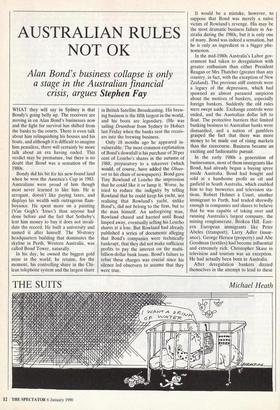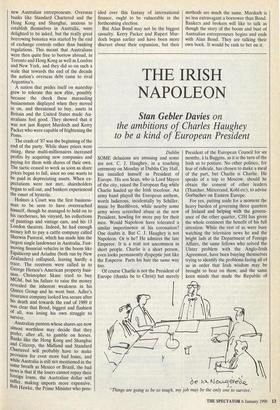AUSTRALIAN RULES NOT OK
Alan Bond's business collapse is only a stage in the Australian financial
crisis, argues Stephen Fay
WHAT they will say in Sydney is that Bondy's going belly up. The receivers are moving in on Alan Bond's businesses now and the fight for survival has shifted from the banks to the courts. There is even talk about him relinquishing his houses and his boats, and although it is difficult to imagine him penniless, there will certainly be more talk about an era having ended. This verdict may be premature, but there is no doubt that Bond was a sensation of the 1980s.
Bondy did his bit for his new-found land when he won the America's Cup in 1983. Australians were proud of him though most never learned to like him. He is arrogant, doesn't like paying taxes, and displays his wealth with outrageous flam- boyance. He spent more on a painting (Van Gogh's "Irises') than anyone had done before and the fact that Sotheby's lent him money to buy it does not invali- date the record. He built a university and named it after himself. The 50-storey headquarters building that dominates the skyline in Perth, Western Australia, was called Bond Tower, naturally.
In his day, he owned the biggest gold mine in the world; he retains, for the moment, his controlling share in the Chi- lean telephone system and the largest share
in British Satellite Broadcasting. His brew- ing business is the fifth largest in the world, and his boats are legendary. (He was sailing Drumbeat from Sydney to Hobart last Friday when the banks sent the receiv- ers into the brewing business.
Only 18 months ago he appeared in- vulnerable. The most common explanation of Bond's downfall is his purchase of 20 per cent of Lonrho's shares in the autumn of 1988, preparatory to a takeover (which would, of course, have added the Obser- ver to his chain of newspapers). Bond gave Tiny Rowland of Lonrho the impression that he could like it or lump it. Worse, he tried to reduce the indignity by telling Rowland that he could keep his yacht, not realising that Rowland's yacht, unlike Bond's, did not belong to the firm, but to the man himself. An unforgiving man, Rowland chased and harried until Bond limped away, eventually selling his Lonrho shares at a loss. But Rowland had already published a series of documents alleging that Bond's companies were technically bankrupt, that they did not make sufficient profits to pay the interest on the multi- billion-dollar bank loans. Bond's failure to rebut these charges was crucial since his silence led observers to assume that they were true.
It would be a mistake, however, to suppose that Bond was merely a naive victim of Rowland's revenge. His may be the most dramatic business failure in Au- stralia during the 1980s, but it is only one of many. Bond was indeed a sensation, but he is only an ingredient in a bigger phe- nomenon.
In the mid-1980s Australia's Labor gov- ernment had taken to deregulation with greater enthusiam than either President Reagan or Mrs Thatcher (greater than any country, in fact, with the exception of New Zealand). The previous stiff controls were a legacy of the depression, which had spawned an almost paranoid suspicion about the motives of bankers, especially foreign bankers. Suddenly the old rules were swept aside. Exchange controls were ended, and the Australian dollar left to float. The protective barriers that limited banking business to Australian banks were dismantled, and a nation of gamblers grasped the fact that there was more money to be made out of rising markets than the racecourse. Business became an exciting and fashionable pursuit.
In the early 1980s a generation of businessmen, most of them immigrants like Bond, had already begun a buying spree inside Australia. Bond had bought and sold at a handsome profit an oil and gasfield in South Australia, which enabled him to buy breweries and television sta- tions. Robert Holmes a Court, another immigrant to Perth, had traded shrewdly enough in companies and shares to believe that he was capable of taking over and running Australia's largest company, the mining conglomerate, Broken Hill. East- ern European immigrants like Peter Abeles (transport), Larry Adler (insur- ance), George Herscu (property) and Abe Goodman (textiles) had become influential and extremely rich. Christopher Skase in television and tourism was an exception. He had actually been born in Australia.
After deregulation bankers dizzied themselves in the attempt to lend to these new Australian entrepreneurs. Overseas banks like Standard Chartered and the Hong Kong and Shanghai, anxious to establish themselves in Australia, were delighted to be asked, but the really great borrowing bonanza was started by the end of exchange controls rather than banking regulations. This meant that Australians were then quite free to borrow abroad, in Toronto and Hong Kong as well as London and New York, and they did so on such a scale that towards the end of the decade the nation's overseas debt came to rival Argentina's.
A nation that prides itself on mateship grew to tolerate this new elite, possibly because the cheek these marauding businessmen displayed when they moved in on, and threatened to buy, assets in Britain and the United States made Au- stralians feel good. They showed that it was not just Rupert Murdoch and Kerry Packer who were capable of frightening the Poms.
The crash of '87 was the beginning of the end of the party. While share prices were rising, these multi-millionaires increased profits by acquiring new companies and Paying for them with shares of their own. The tactic ceased to work as soon as share prices began to fall, since no one wants to be paid in depreciating assets. When ex- pectations were not met, shareholders began to sell out, and bankers experienced the onset of hysteria.
Holmes a Court was the first business- man to be seen to have overreached himself, though he managed to hold on to his racehorses, his vinyard, his collections of paintings and vintage cars, and his 13 London theatres. Indeed, he had enough money left to pay a cattle company called Sherwin Pastoral, which has made him the largest single landowner in Australia, Fast- moving financial vehicles in the boom like Equiticorp and Ariadne (both run by New Zealanders) collapsed, leaving hardly a trace. The receivers were called in to George Herscu's American property busi- ness. Christopher Skase tried to buy MGM, but his failure to raise the money revealed the inherent weakness in his Qintex Group and he went bust. Adler's insurance company looked less secure after his death and towards the end of 1989 it was clear that Bond, biggest and flashiest of all, was losing his own struggle to survive.
Australian punters whose shares are now almost worthless may decide that they prefer, after all, to gamble on horses. Banks like the Hong Kong and Shanghai and Citicorp, the Midland and Standard Chartered will probably have to make provision for even more bad loans, and while Australia is still not mentioned in the same breath as Mexico or Brazil, the bad news is that if the losers cannot repay their foreign loans, the Australian dollar will suffer, making imports more expensive. Bob Hawke, the Prime Minister who pres-
ided over this fantasy of international finance, ought to be vulnerable in the forthcoming election.
But Alan Bond may not be the biggest casualty. Kerry Packer and Rupert Mur- doch began earlier and have been more discreet about their expansion, but their
methods are much the same. Murdoch is no less extravagant a borrower than Bond. Bankers and brokers will like to talk as though the story of the boom and bust of Australian entrepreneurs begins and ends with Alan Bond. They are talking their own book. It would be rash to bet on it.











































 Previous page
Previous page